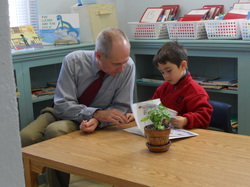
My second experience took place last evening when I joined a group of our parents in the library at the school and we watched and discussed the film The Big Picture: Rethinking Dyslexia. The common thread that linked many of the parents at both events was a general dissatisfaction with the level of support available for children with Learning Differences. Now, given the fact that this is the area of specialization for our school, it is hardly surprising that I would be speaking with current parents who had left their previous school for ours, and potential parents who were looking for a change. Having said that, there were a number of commonalities in the stories that I was hearing that made me pause to consider why we find ourselves, in the second decade of the twenty-first century, still struggling to meet the needs of all of the learners in our care. It was also revealing to meet a generation of new parents who were not even willing to give public education a chance. They had become convinced, for a variety of reasons, that their only real alternative was to pay for their child's schooling.
For twenty-five years, I worked in the public system in Ontario as a teacher, Head of Special Education, Principal and Superintendent of Schools. I knew many outstanding and dedicated educators, saw excellent programmes in operation, and witnessed wonderful things happening for students with a broad range of learning needs. There were fantastic things happening for the children in those schools, and the same is still true of many schools today.
So why the dissatisfaction? Why is my school full with a waiting list and why are so many parents searching for alternatives for their children? The answer is as simple as it is depressing. As educators and schools we know what to do, but we just don't do it consistently enough from building to building. For children and their parents, education - public and private - often becomes a matter of "luck of the draw". If your child's needs meet the programme in place in your local public school or independent school of choice then everything works out well. If they don't, it doesn't!
Some critics would contend that it is all about money. Independent schools or schools from affluent neighbourhoods can provide the resources that less fortunate schools can't. People point to technology, class size, library collections, labs - all the trappings, and decry the disparities among schools.
Some would contend that it is restrictive versus open admissions. Schools that are faced with serving everyone who comes in the door have a tougher job than those that can pick and choose their clientele.
Some point their finger at external constraints - Ministry funding, School District decision-making, union contacts - as getting in the way of serving students.
The only problem with any of these factors is that they don't explain why some schools succeed in this regard while others fail miserably. There are great schools, doing amazing things for a wide range of students, who would be on the "losing" end of each of those equations above. But they still pull it off! Conversely, there are "rich" schools with minimal constraints from Ministries and unions that don't deliver the goods.
So what's the answer? It all comes down to people, individual teachers and administrators, who make it happen for the students in their schools. If there is a culture in a school that embraces students who learn differently, that welcomes dialogue with parents and external professionals, that is willing to try different approaches until they find something that works - then that is the place where you want to send your child! Ultimately, success in school is about "fit".
When students leave our school, one of the most critically important parts of the process is a transition meeting between our support team and the staff of the receiving school. We sit down with them and the student's parents to outline the accommodations that we have found can help to make that particular child successful. For the new school, it is a chance for them to reflect on, and commit to, the supports that they can put in place. For our parents it is an opportunity to make sure that the school fits their child.
Sending our students on to their next level of education, into a learning environment she or he will "belong", is one of the most important final services that we can perform for our kids. It is the key to their future school success.
At the end of the day, it is all about fit.



 RSS Feed
RSS Feed
